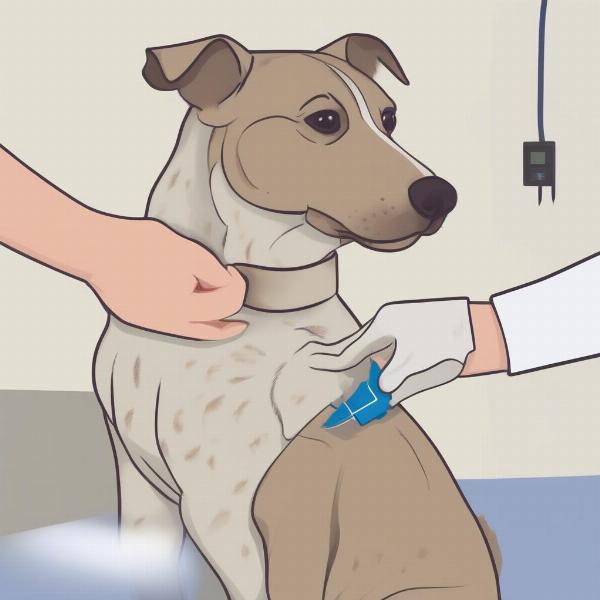Owning a dog is a big responsibility, and understanding the legalities involved is crucial. Many people wonder, “When is a dog legally yours?” The answer isn’t always straightforward and varies depending on your location and the specific circumstances of how you acquired the dog. This article will explore the various scenarios that determine legal ownership of a dog, providing clarity and guidance for both new and experienced dog owners.
Understanding Legal Dog Ownership
Legal dog ownership typically involves demonstrating that you have assumed responsibility for the dog’s care and well-being. This includes providing food, shelter, veterinary care, and meeting any licensing or registration requirements mandated by your local authorities. Simply finding a stray dog, for instance, doesn’t automatically make it legally yours. Likewise, verbally agreeing to take a dog from a friend isn’t always legally binding.
Acquiring a Dog from a Shelter or Rescue
Adopting a dog from a shelter or rescue organization is one of the most common ways to acquire a dog legally. The process typically involves signing a contract or adoption agreement, transferring ownership from the organization to you. This agreement outlines your responsibilities as the new owner and often includes clauses about returning the dog to the shelter if you can no longer care for it. Once you’ve signed this agreement and paid any associated adoption fees, the dog is legally yours.
Buying a Dog from a Breeder
When purchasing a dog from a breeder, a sales contract is usually involved. This contract officially transfers ownership of the dog to you and may include stipulations regarding breeding rights, health guarantees, and other important details. It’s crucial to read this contract carefully before signing to ensure you understand your rights and obligations. Upon signing the contract and completing the payment, the dog becomes legally yours.
Taking Ownership from a Previous Owner
If you acquire a dog from a friend, family member, or another individual, it’s essential to have a written agreement outlining the transfer of ownership. This document should clearly state that the previous owner relinquishes all rights and responsibilities for the dog to you. This protects both parties involved and helps avoid disputes about ownership later on. While a verbal agreement might suffice in some cases, a written agreement provides much stronger legal protection.
Found Dogs and Stray Dogs
Finding a stray dog doesn’t automatically grant you legal ownership. In most jurisdictions, you are legally obligated to report the found dog to animal control or a local shelter. This allows the original owner a chance to reclaim their pet. If the dog is microchipped, the shelter can typically contact the owner quickly. If no owner comes forward within a specific holding period (which varies by location), you may then have the option to legally adopt the dog.
Microchipping and Registration: Key to Ownership
Microchipping your dog is a crucial step in establishing legal ownership and ensuring their safe return if they ever get lost. The microchip contains a unique identification number linked to your contact information. Registering this microchip with a national database is essential to make this system effective. Although microchipping itself doesn’t establish legal ownership, it helps prove your connection to the dog and can be valuable evidence in ownership disputes.
 Dog Microchipping Process
Dog Microchipping Process
Conclusion
Understanding when a dog is legally yours involves more than just taking physical possession of the animal. It requires fulfilling certain legal obligations and responsibilities, which can vary depending on how you acquire the dog. Whether you adopt from a shelter, buy from a breeder, or take ownership from a previous owner, ensuring proper documentation and adhering to local regulations are essential for establishing legal ownership and protecting your rights as a dog owner. Remember to prioritize the dog’s well-being and responsible care throughout the process.
FAQ
- What if I find a dog with no identification? You should still report the dog to local animal control or a shelter.
- Do I need a license for my dog? Licensing requirements vary by location; check with your local authorities.
- Is a verbal agreement sufficient for transferring ownership? A written agreement is always recommended for legal protection.
- Can I sell a dog I adopted from a shelter? Most shelters require you to return the dog to them if you can no longer care for it.
- What if I buy a dog from a breeder and it becomes ill? Refer to your sales contract, which may include health guarantees.
- How can I update my information on my dog’s microchip? Contact the microchip registry company directly to update your details.
- What if I disagree with a breeder about a dog’s ownership? Seek legal advice to resolve ownership disputes.
Related Articles
About ILM Dog
ILM Dog is your trusted international resource for comprehensive dog care and training advice. We offer expert guidance on various aspects of dog ownership, including breed selection, health and medical care, training and behavior, nutrition, grooming, exercise, puppy care, senior dog care, travel tips, and product recommendations. We’re dedicated to helping you provide the best possible care for your canine companion. For any inquiries, contact us at [email protected] or call us at +44 20-3965-8624. We are experts in various dog breeds and can provide guidance on choosing the right breed for you. For professional advice tailored to your specific needs, contact ILM Dog today. We also offer a wide selection of 3 inch wide dog collars, skinny dog collar, and even a stylish turquoise leather dog collar.